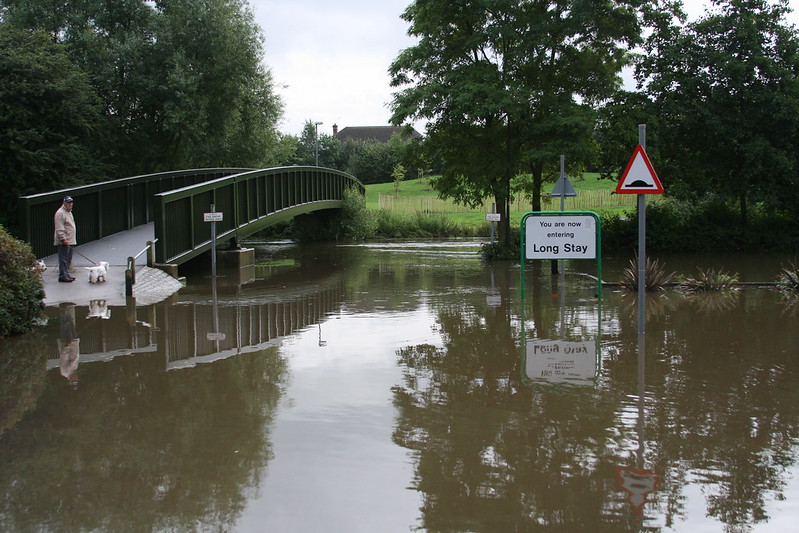The public are calling for immediate climate adaptation action

A blog about the Climate Adaptation Dialogues project, by the project team at Ipsos and the University of Leeds.
After the record-breaking June temperatures in the UK and the flooding that followed, the publication of the third National Adaptation Programme (NAP3) could not be more timely. This document sets out the programme for government action with regard to adapting to climate change. But how do the public feel about the key climate impacts affecting the country and the adaptation actions being implemented?
Last year, Ipsos, working with the University of Leeds, conducted a public dialogue to explore the public’s perspectives of climate impacts and adaptation and how they think the government, businesses and civil society should contribute.
Overseen by Defra and the UK Research and Innovation (UKRI) Sciencewise Programme, the project engaged 112 participants from Hull and East Riding, Greater Manchester, Dartmoor and Exmoor, and Inner London in discussion about priorities and responsibility for climate adaptation action and what a well-adapted England should look like. Findings from the dialogue contributed to the evidence base that informed NAP3.
This pioneering deliberative dialogue, involving six workshops in each area, is one of the first to consult the public on how we adapt to the unavoidable impacts of climate change in England. This involved discussion between participants, along with inputs from experts on climate change projections, likely impacts from extreme weather and adaptation actions. Participants had the opportunity to interact with and quiz the experts during the workshops.

Scorched grass in Greenwich Park, London, England, during a heatwave in August 2022. CC BY-SA 2.0 Alisdare Hickson
The evident shock and surprise expressed by participants regarding the range, immediacy, and seriousness of climate change risks highlighted an urgent need for more engagement and awareness raising. There was also a real concern that more action should have been taken sooner, and that proactive, preventative steps are now needed, rather than reacting to events as they happen.
There was a strong consensus amongst participants that protecting vulnerable people and their homes along with those most at risk should be the top priorities for adaptation. Participants also firmly believed that responsibility for action lay with central and local government, although they did also believe that businesses should a take greater responsibility and everyone, including individuals, should do their bit.
A key theme emerging from the dialogue was the need for enhanced, ongoing, and extensive communication and engagement with the public on key climate risks and adaptation actions. The dialogue itself was identified as a really effective way of providing clear information about the risks and highlighting positive examples of adaptation.
The publication of NAP3 is the start of a period of renewed action on climate change adaptation to enhance the country’s resilience. It is essential that its delivery is supported by a widespread engagement programme to raise awareness of the climate change impacts that are likely to affect us, the actions we need to take and the actions that are already being implemented. Through education and awareness, the Government’s adaptation programme should involve the whole country so that the NAP is not just a programme for government but a national plan of action for everyone.
Suraje Dessai, Professor of Climate Adaptation at the University of Leeds said: “This work has shown that the public are very concerned about the impacts of a changing climate. They think the nation is unprepared and that action is urgently needed now.
“For the first time, the public has articulated what a well-adapted England should look like. I hope this work will help the government and other key stakeholders better define the aims and objectives of national adaptation policy.”
Dr Rachel Harcourt, Research Fellow at the University of Leeds said: “This research provides newly detailed insight into how people feel about climate change risks and adaptation in England. It emphasises the extent to which people are aware of and concerned about a range of climate risks, including hotter weather.
“It also provides evidence of a growing social mandate for the UK to greatly increase the speed and scale of its preparations for a changing climate. Following the publication of NAP3 yesterday, this report provides further support to achieving its delivery.”
Rachel Brisley, Ipsos Head of Energy and Environment and Project Director said: “We are extremely grateful to the participants for giving so much of their time to provide such valuable insights.
“The findings from this study are crucially important for government, businesses and those working in the climate adaptation industry and should pave the way for a national conversation on building our climate resilience.”
Take a look at the full results of the project online.
Top image: Buckingham Floods, CC BY 2.0 Keith Williams
